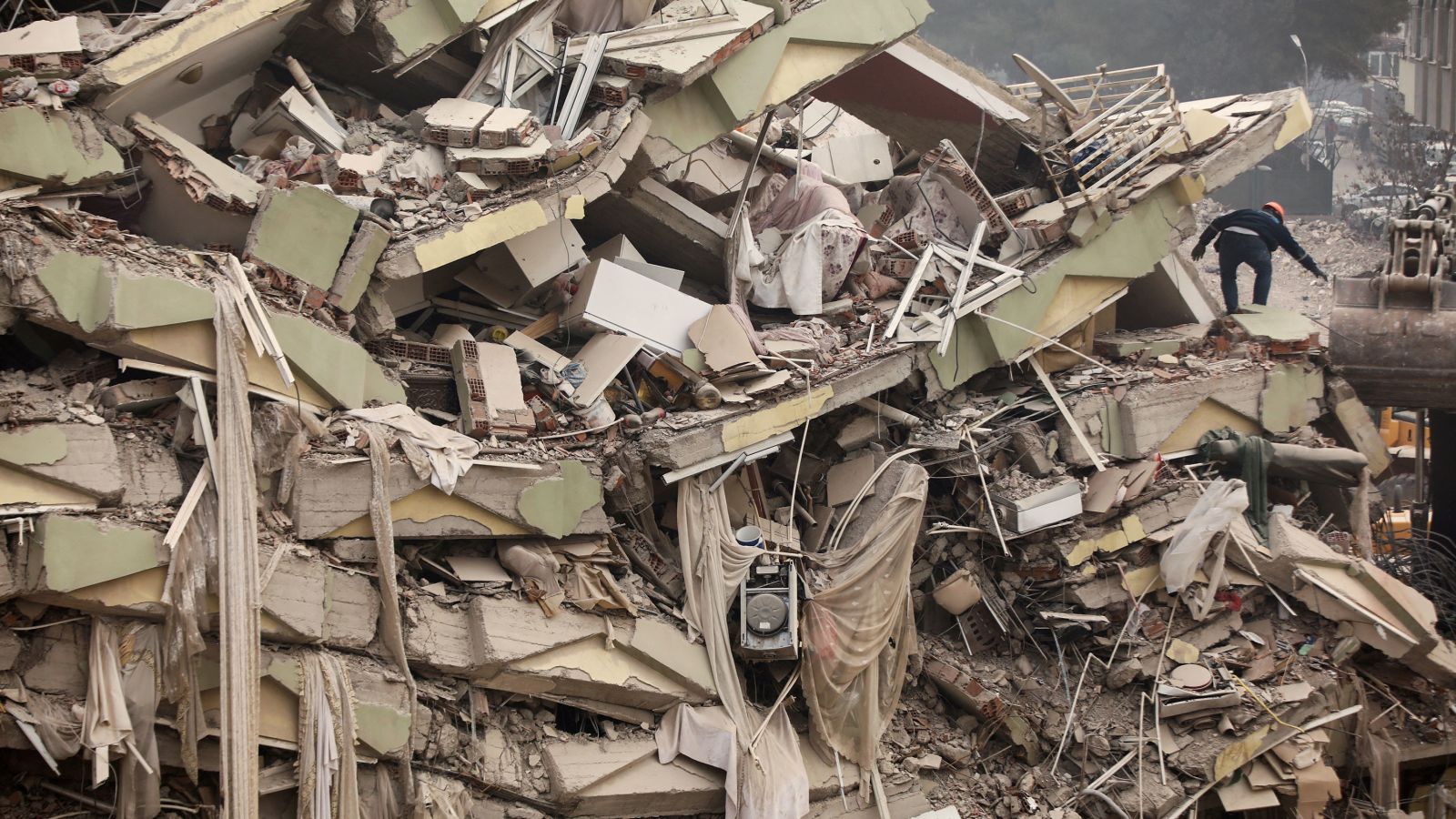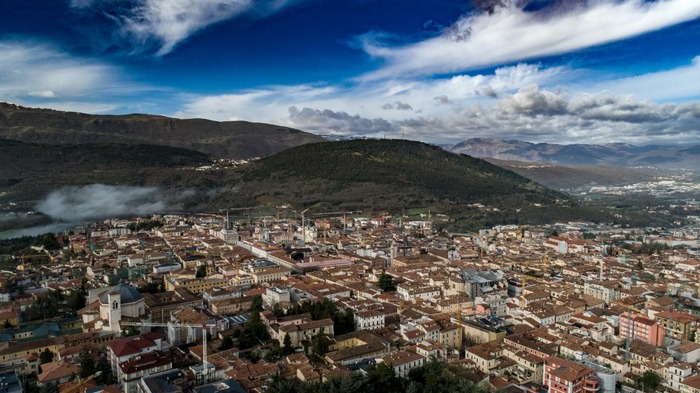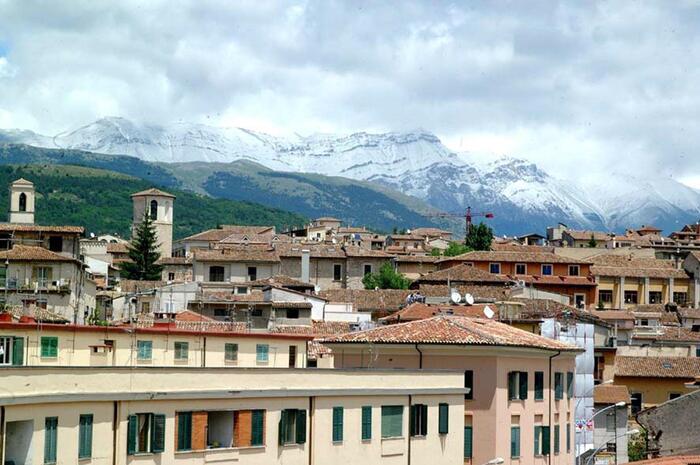Freezing temperatures worsen the tragedy in Turkey 2:37
(CNN) --
Five days after a massive 7.8 magnitude earthquake rocked Turkey and Syria, the death toll is staggering.
Drone images and satellite imagery have conveyed the stark reality of widespread destruction in an area stretching across two very different countries.
The scale of the disaster is enormous.
“We've done some mapping of the size of the affected area,” said Caroline Holt, director of disasters, climate and crisis for the International Federation of the Red Cross (IFRC).
“It's the size of France,” she explained.
"They have given me a new life again," says man rescued in Turkey after earthquake
United Nations Secretary General António Guterres said Thursday that "we have not yet seen the full extent of the damage and the humanitarian crisis unfolding before our eyes," while World Health Organization estimates suggest that up to 23 million people could be affected by the natural disaster.
Once the search efforts are complete, the focus will turn to the longer-term rebuilding.
Turkey has suffered earthquakes in the past and has rebuilt.
But how much can be learned from this story?
Will these lessons be implemented?
And will the efforts be matched across the border?
advertising
History repeats itself in Turkey
The death toll passed the grim milestone of 25,000 this Saturday.
As it continues to rise, it is mixed with feelings of anger and resentment.
Turkey is no stranger to earthquakes and many feel the government failed to prepare for another catastrophic event.
This frustration dogged Turkey's President Recep Tayyip Erdogan as he took a whirlwind tour of the Kahramanmaras region, near the epicenter of the deadly quake, on Wednesday and Thursday.
Erdogan defended the government's response to him by admitting "deficiencies", before emphasizing that "it is not possible to be prepared for such a disaster".
He also announced that the government's goal is to rebuild "within a year," though experts told CNN it could take much longer.
Large earthquakes like this are rare, but many in Turkey are still haunted by memories of the 1999 Izmit earthquake in the Marmara region.
Ajay Chhibber, an economist who was the World Bank director for Turkey when the magnitude 7.6 earthquake struck two decades ago, told CNN that "it's like a bad movie [that] comes back again."
Similar to this week's event, that tremor occurred in the early hours but occurred in the northwest of the country, a densely populated area closer to Istanbul.
He said it lasted about 45 seconds, leaving more than 17,000 dead and some 500,000 homeless.
Flying to the region immediately after the disaster, Chhibber told CNN that he had "never seen such devastation."
He recalled traveling with the Japanese and German ambassadors at the time, who told him "it looks like World War II."
Buildings "crushed like pancakes" were among the apocalyptic scenes Chhibber witnessed in 1999. In the town of Golcuk, where a naval base was located, he recalled seeing "submarines being thrown out of the water, 90 or 100 meters in the mountain".
“You could see submarines there.
It was incredible.
And what I'm seeing now is just a replay,” she said.
Some may question whether the Turkish president's current goal of rebuilding the country is achievable, as he also said more than 6,000 buildings have collapsed.
But Chhibber noted that "Turkey is capable of moving very, very quickly, if they can get their act together on this."
Chhibber helped implement a four-stage recovery plan in the aftermath of the 1999 disaster that provided cash to residents, helped rebuild infrastructure and housing, established an insurance system, and developed an organizational system that cascaded down from the national level to the community.
“Compared to disasters around the world, it was one of the fastest rebuilds and recoveries I've ever seen,” Chhibber said.
He added that most of the work was completed in two years.
Ismail Baris, a professor of social work at Istanbul's Uskudar University and the former mayor of Golcuk at the time of the earthquake, told CNN in an email that "in addition to the collapsed public and private buildings, the water pipelines of the city, the water supply network, the sewage system [and] the stormwater system were completely destroyed,” as well as 80% of the city's roads.
He added that the complete reconstruction of the city took four years.
However, much of the reconstruction then was done with the help of the Turkish Army, which was called in when many local governments collapsed.
Chhibber said this allowed debris cleanup to be done quickly.
“But Izmit is in the heart of Turkey,” Chhibber said.
Many Kurds live in the earthquake-affected areas and bringing in the army can cause problems.
"It's a huge challenge," said Ilan Kelman, professor of disasters and health at University College London.
While the Army has the manpower and resources, "they also have the unfortunate history of often abusing their power," Kelman told CNN.
A child is rescued after more than 105 hours of the earthquake in Turkey
“The Kurds and many Turks in that region would understandably be very hesitant to have the Army on the streets even more than they already do,” he said.
The experts said there must also be a review of what went wrong.
The country has strict rules that came into effect after 1999: building regulations were put in place that required the most modern buildings to be able to withstand these earthquakes.
However, many of the apartment blocks within the earthquake zone appeared to have been recently built and collapsed just the same.
Sinan Ulgen, a former Turkish diplomat who currently chairs the Istanbul-based Center for Economics and Foreign Policy, said there was awareness of the preparations that still needed to be made, but "unfortunately, in the last two decades, this has mostly remained in the background." paper"
“There was a special fund with the taxes collected to rehabilitate cities to resist this type of natural disaster.
Some of that money was wasted, it didn't go to the right places.
And then the lack of enforcement, which is really the big liability," Ulgen told the UK's Channel 4 television.
And there, Turkey really needs to up their game."
Chhibber also said that Turkey had not learned enough from the lessons of the past and questioned why building regulations were not enforced.
He said the Turkish government had regularly allowed so-called "construction amnesties," essentially legal exemptions that, for a fee, allowed projects to be produced without the necessary safety requirements.
The most recent amnesty was approved in 2018.
People await news of their loved ones, believed to be trapped under a collapsed building on February 11, 2023 in Hatay, Turkey.
(Photo by Burak Kara/Getty Images)
People await news of their loved ones, believed to be trapped under buildings that collapsed during the earthquake on Monday, February 9, 2023 in Hatay, Turkey.
(Credit: Burak Kara/Getty Images)
He said granting amnesties was "a big problem."
“They just go ahead and do the building.
They don't follow the code.
They know that at some point some politicians will give them an amnesty.
That is a big problem".
Turkey's justice minister said on Friday that investigations into builders in seismic regions had begun, according to Turkey's state media Anadolu.
“As a result, as I said, whoever has faults, negligence or shortcomings will be brought to Justice and will be held accountable under the law,” Bekir Bozdağ said.
Syrian crises accumulate
Across the border, in Syria, reconstruction efforts will be even more complicated.
Guterres warned on Thursday that Syrians face "nightmares about nightmares," with the World Food Program describing the situation in the north-west of the country as a "catastrophe upon catastrophe."
“We have the perfect humanitarian storm in Syria,” said Caroline Holt, IFRC director of disasters, climate and crisis.
The UN estimates that more than four million people were already dependent on humanitarian aid in the hardest-hit parts of rebel-controlled Syria, due to the civil war that has raged in the country since 2011. When the earthquake struck there, many residents traumatized they first wondered if what woke them up was the sound of fighter jets once more.
"After 12 years of constant pain and suffering and living in a vulnerable context, their ability to withstand, especially in winter, the harsh conditions they face [diminishes]," Holt told CNN.
In Syria, the political fault lines run deep.
Some of the areas hardest hit by the quake are controlled by the Assad regime, others by Turkish and US-backed opposition forces, Kurdish rebels and Sunni Islamist fighters.
These political divisions create logistical knots.
Trading them will complicate recovery efforts.
“The conflict — or the conflicts — are much worse in that part of Syria than in that part of Turkey,” Kelman said.
While Turkey has its own political problems, it "has a comparatively strong government and a comparatively strong army relative to Syria, which is at war," he added.
A woman and her two daughters were rescued in Turkey on the fifth day since the earthquake
Turkey also has greater "pre-earthquake resources," Kelman said.
“Neither country is especially rich, but Turkey at least has that baseline where it hasn't been in a major conflict dividing the country for 12 years.
They have not been isolated through sanctions.”
The sanctions have created geopolitical obstacles that humanitarian aid now has to navigate.
The Assad regime insists that all aid coming into the country, including for areas beyond its control, must go through the capital, Damascus.
The Syrian government on Friday approved the shipment of aid to rebel territory in the northwest, according to a statement, but did not provide a timetable for the delivery.
Syrian soldiers watch as rescue workers use heavy machinery to examine the rubble of a collapsed building in the northern city of Aleppo.
AFP/Getty Images
But the regime has long diverted aid intended for rebel-held regions.
As such, relief workers trying to clear the rubble are dependent on resources sent via a single highway, the Bab al-Hawa crossing, the only humanitarian aid corridor between Turkey and Syria.
The result is that “most of the work is done by hand,” according to Mohammad Hammoud, Syria manager for the Norwegian Red Cross.
Hammoud told CNN that Syria lacks the machinery available in Turkey, and what little machinery they have has no fuel to run, after supplies from Damascus were cut off.
“We mainly depend on labor,” he said.
These discrepancies mean that Syria's recovery is likely to progress along a stunted timetable.
Given your lack of coordination, basic questions may remain unanswered for some time.
“First of all, it is about removing the rubble.
What are you doing with that?
It can become an environmental hazard or it can become an asset, if you choose to pave roads with it,” Holt said.
The head of the IFRC estimates that in Turkey much of the recovery work will be done within two to three years.
But in Syria, "we're looking at a five to 10-year timeframe just to kick-start the recovery," he said.
the years to come
While disasters like this wreak havoc, they also create opportunities to prevent such havoc from happening again.
There is a part that is the responsibility of the human being in every natural disaster, according to Chhibber.
Earthquakes are inevitable;
its effects are not.
Chhibber said he saw this point illustrated after the 1999 Izmit earthquake. "You'd have one building completely upright, the next building completely flat as a pancake."
The same can now be seen in Turkey's Gaziantep.
A person walks between tents of the Turkish Disaster and Emergency Management Agency in the southeastern city of Kahramanmaras on February 8.
Ozan Kose/AFP/Getty Images
Aerial photo showing the destruction in the center of the city of Kahramanmaras on February 9.
IHA via AP
For Chhibber, this is the election result.
“There is an earthquake, but it doesn't have to be a disaster on this scale, unless it's man-made.
And the man-made part comes from the lack of a proper building code that is enforced.
There's no reason these buildings should have collapsed so easily.
Some of them were built just a year or two ago,” he said.
Kelman also emphasized that disasters create the opportunity for things to be done differently.
He hopes the earthquake can be used as a stimulus for "disaster diplomacy", which he asks "whether or not dealing with disasters can somehow end conflict and create peace."
However, not all governments choose to take advantage of these opportunities.
“We have examples where people have taken the opportunity to say there's been a disaster and we want to help, so let's try to rebuild in a way that we're supporting peace,” Kelman said.
"At the moment, I don't see any government responding that way, and I don't see the world responding that way."
CNN's Isil Sariyuce, Reyhan Baysan, Hande Atay Alam, Nadeen Ebrahim, Dalya Al Masri, Mostafa Salem and Eyad Kourdi contributed to this report.
SyriaTurkey


/cloudfront-eu-central-1.images.arcpublishing.com/prisa/E2SOPDAIKRGJPJY4T2WETDP77I.jpg)











/cloudfront-eu-central-1.images.arcpublishing.com/prisa/B7F2F3HZ2JCUHDZJKAGKAXXPSU.jpg)